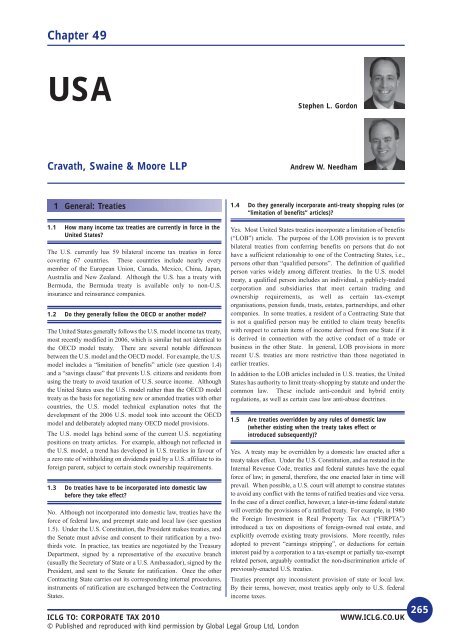Corporate Tax 2010 - BMR Advisors
Corporate Tax 2010 - BMR Advisors
Corporate Tax 2010 - BMR Advisors
Create successful ePaper yourself
Turn your PDF publications into a flip-book with our unique Google optimized e-Paper software.
Chapter 49<br />
USA<br />
Stephen L. Gordon<br />
Cravath, Swaine & Moore LLP<br />
Andrew W. Needham<br />
1 General: Treaties<br />
1.4 Do they generally incorporate anti-treaty shopping rules (or<br />
“limitation of benefits” articles)<br />
1.1 How many income tax treaties are currently in force in the<br />
United States<br />
The U.S. currently has 59 bilateral income tax treaties in force<br />
covering 67 countries. These countries include nearly every<br />
member of the European Union, Canada, Mexico, China, Japan,<br />
Australia and New Zealand. Although the U.S. has a treaty with<br />
Bermuda, the Bermuda treaty is available only to non-U.S.<br />
insurance and reinsurance companies.<br />
1.2 Do they generally follow the OECD or another model<br />
The United States generally follows the U.S. model income tax treaty,<br />
most recently modified in 2006, which is similar but not identical to<br />
the OECD model treaty. There are several notable differences<br />
between the U.S. model and the OECD model. For example, the U.S.<br />
model includes a “limitation of benefits” article (see question 1.4)<br />
and a “savings clause” that prevents U.S. citizens and residents from<br />
using the treaty to avoid taxation of U.S. source income. Although<br />
the United States uses the U.S. model rather than the OECD model<br />
treaty as the basis for negotiating new or amended treaties with other<br />
countries, the U.S. model technical explanation notes that the<br />
development of the 2006 U.S. model took into account the OECD<br />
model and deliberately adopted many OECD model provisions.<br />
The U.S. model lags behind some of the current U.S. negotiating<br />
positions on treaty articles. For example, although not reflected in<br />
the U.S. model, a trend has developed in U.S. treaties in favour of<br />
a zero rate of withholding on dividends paid by a U.S. affiliate to its<br />
foreign parent, subject to certain stock ownership requirements.<br />
1.3 Do treaties have to be incorporated into domestic law<br />
before they take effect<br />
No. Although not incorporated into domestic law, treaties have the<br />
force of federal law, and preempt state and local law (see question<br />
1.5). Under the U.S. Constitution, the President makes treaties, and<br />
the Senate must advise and consent to their ratification by a twothirds<br />
vote. In practice, tax treaties are negotiated by the Treasury<br />
Department, signed by a representative of the executive branch<br />
(usually the Secretary of State or a U.S. Ambassador), signed by the<br />
President, and sent to the Senate for ratification. Once the other<br />
Contracting State carries out its corresponding internal procedures,<br />
instruments of ratification are exchanged between the Contracting<br />
States.<br />
ICLG TO: CORPORATE TAX <strong>2010</strong><br />
© Published and reproduced with kind permission by Global Legal Group Ltd, London<br />
Yes. Most United States treaties incorporate a limitation of benefits<br />
(“LOB”) article. The purpose of the LOB provision is to prevent<br />
bilateral treaties from conferring benefits on persons that do not<br />
have a sufficient relationship to one of the Contracting States, i.e.,<br />
persons other than “qualified persons”. The definition of qualified<br />
person varies widely among different treaties. In the U.S. model<br />
treaty, a qualified person includes an individual, a publicly-traded<br />
corporation and subsidiaries that meet certain trading and<br />
ownership requirements, as well as certain tax-exempt<br />
organisations, pension funds, trusts, estates, partnerships, and other<br />
companies. In some treaties, a resident of a Contracting State that<br />
is not a qualified person may be entitled to claim treaty benefits<br />
with respect to certain items of income derived from one State if it<br />
is derived in connection with the active conduct of a trade or<br />
business in the other State. In general, LOB provisions in more<br />
recent U.S. treaties are more restrictive than those negotiated in<br />
earlier treaties.<br />
In addition to the LOB articles included in U.S. treaties, the United<br />
States has authority to limit treaty-shopping by statute and under the<br />
common law. These include anti-conduit and hybrid entity<br />
regulations, as well as certain case law anti-abuse doctrines.<br />
1.5 Are treaties overridden by any rules of domestic law<br />
(whether existing when the treaty takes effect or<br />
introduced subsequently)<br />
Yes. A treaty may be overridden by a domestic law enacted after a<br />
treaty takes effect. Under the U.S. Constitution, and as restated in the<br />
Internal Revenue Code, treaties and federal statutes have the equal<br />
force of law; in general, therefore, the one enacted later in time will<br />
prevail. When possible, a U.S. court will attempt to construe statutes<br />
to avoid any conflict with the terms of ratified treaties and vice versa.<br />
In the case of a direct conflict, however, a later-in-time federal statute<br />
will override the provisions of a ratified treaty. For example, in 1980<br />
the Foreign Investment in Real Property <strong>Tax</strong> Act (“FIRPTA”)<br />
introduced a tax on dispositions of foreign-owned real estate, and<br />
explicitly overrode existing treaty provisions. More recently, rules<br />
adopted to prevent “earnings stripping”, or deductions for certain<br />
interest paid by a corporation to a tax-exempt or partially tax-exempt<br />
related person, arguably contradict the non-discrimination article of<br />
previously-enacted U.S. treaties.<br />
Treaties preempt any inconsistent provision of state or local law.<br />
By their terms, however, most treaties apply only to U.S. federal<br />
income taxes.<br />
WWW.ICLG.CO.UK<br />
265
















